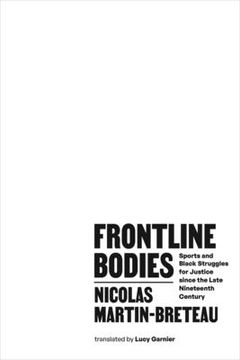Frontline Bodies: Sports and Black Struggles for Justice Since the Late Nineteenth Century (in English)
Synopsis "Frontline Bodies: Sports and Black Struggles for Justice Since the Late Nineteenth Century (in English)"
A captivating exploration of Black American civil rights activism through the lens of sport.In Frontline Bodies, Nicolas Martin-Breteau argues that sports are not--and have never been--purely about entertainment for Black Americans. Instead, beginning in the 1890s during Reconstruction, Black Americans proactively used athletics as a tactic to fight racial oppression. Since the body was the primary target of anti-Black racial oppression, African Americans turned sports into a key medium in their struggles for dignity, equality, and justice. Although Black photography and art also aimed at displaying the dignity of the Black body, sports arguably had the greatest impact on American and international public opinion. Martin-Breteau considers the work of Edwin B. Henderson, a prominent Black physical educator, civil rights activist, and historian of Black sports. Training Black children as athletes, Henderson felt, would work both to fortify racial pride and to dismantle racial prejudices--two necessary requirements for a successful political liberation struggle. In this way, physical education became political education. By the end of World War II, the tactic of racial uplift through sports had reached its peak of popularity, only to subsequently lose its appeal among younger activists, many of whom believed that the strategy was ineffective in fighting institutional racism and served mainly as an emulation of middle-class white norms. By the end of the twentieth century, Martin-Breteau argues, racial uplift through sports had lost its emancipating power. The emphasis on the accumulation of wealth for professional athletes, as well as sports' ability to reinforce anti-Black stereotypes, had become a political problem for true collective liberation. For a marginalized group of people that has been physically excluded from the democratic process, however, sports remain a political resource. By studying the relationship between athletics and politics, Frontline Bodies renews the history of minority bodies and their power of action.

